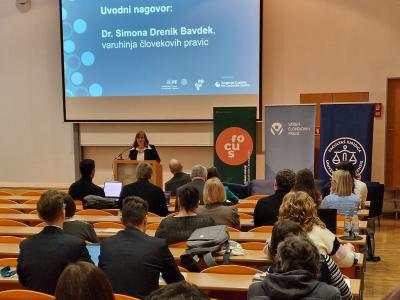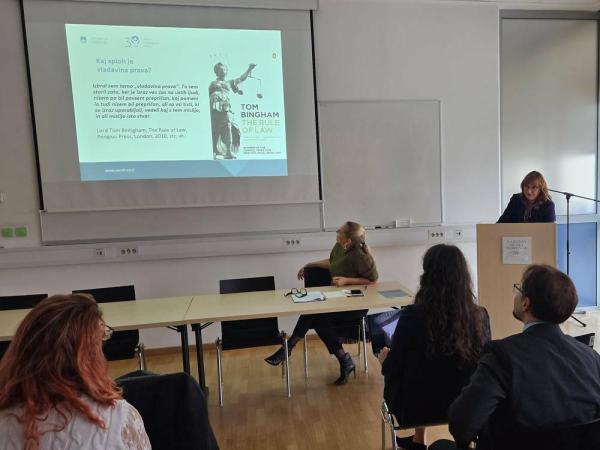The Human Rights Ombudsman warns of the need to strengthen the rule of law through respect for human rights
Dr. Simona Drenik Bavdek, Assistant Head of the Center for Human Rights at the Human Rights Ombudsman of the Republic of Slovenia, also participated in the national consultation on Critical Points of the Rule of Law, which took place today, 23 October 2025, at the National Museum of Slovenia in Ljubljana and was organised by the Legal Centre for the Protection of Human Rights and the Environment (PIC). The event was intended to evaluate the process of reporting on the state of the rule of law in the European Union and to discuss improvements to mechanisms for more effective protection of the rule of law and human rights.
Dr. Drenik Bavdek highlighted the systemic aspect of human rights as the foundation of the rule of law, emphasising that the rule of law cannot exist without consistent respect for human rights, democracy, and the separation of powers. She presented the findings of the European Commission and the European Network of National Human Rights Institutions (ENNHRI), which show that a negative trend in the area of respect for the rule of law continues in many European Union (EU) countries. This is reflected in the reduction of budget funds for independent institutions, pressure on civil society and the media, lengthy court proceedings, and the ineffective enforcement of judgments of national and international courts. She particularly highlighted the ENNHRI's finding that the conditions for the operation of national human rights institutions (NHRIs) in the EU have been deteriorating for several years, which threatens their ability to monitor and address systemic human rights violations.
Dr. Drenik Bavdek also presented the national contribution of the Human Rights Ombudsman (Ombudsman) to the ENNHRI regional report on the state of the rule of law in Europe in 2025. In it, the Ombudsman highlighted several key challenges in the field of respect for human rights in Slovenia. Among other things, he pointed out the ineffective implementation of his recommendations by state authorities, especially in the areas of deinstitutionalization, health care and the rights of persons with disabilities. He also highlighted the failure to enforce decisions of the Constitutional Court of the Republic of Slovenia, which constitutes a serious violation of the principles of the rule of law and the separation of powers
The Ombudsman placed significant emphasis on the lack of systematic collection of disaggregated data by protected personal circumstances, which prevents effective monitoring of (in)equality in society. The Ombudsman has also been calling for the inclusion of human rights content in the training programmes of civil servants and in the curricula of primary and secondary schools for several years in a row, in order to strengthen the culture of human rights and the understanding of their connection with the rule of law.
Dr. Drenik Bavdek also highlighted that it is particularly worrying that the Ombudsman institution has been operating without a head with a full mandate for several months, which reduces its independence and affects its effectiveness. She also stressed the need to amend the Human Rights Ombudsman Act, which should ensure a transparent procedure for appointing leadership, in line with the Paris Principles of the United Nations, and strengthen the Ombudsman's institutional and financial autonomy.
In her contribution, she also presented some of the Ombudsman's key recommendations addressed to the Government and other state bodies. She said that the Ombudsman calls for transparent and objective financing of civil society and for the creation of a legal framework to prevent SLAPP lawsuits. Among other things, she emphasises the need to strengthen the independence of the judiciary, by ensuring adequate human and financial resources and a deliberate expansion of the jurisdiction of the courts. She recommends improving legislation to prevent hate speech and increasing the transparency of the legislative process, by involving the public from the initial stages. She draws attention to the need for timely enforcement of judgments of the European Court of Human Rights and the establishment of a mechanism for monitoring decisions of the Constitutional Court. She also proposes the establishment of an independent body to monitor the implementation of the Convention on the Rights of Persons with Disabilities, the ratification of the Optional Protocol to the International Covenant on Economic, Social and Cultural Rights, and the consideration of withdrawing reservations to the Istanbul Convention.
Dr. Drenik Bavdek concluded by stressing that Slovenia, like all EU member states, must establish a stable framework in which human rights and the rule of law will mutually reinforce each other. “The rule of law is not just a legal concept, but a condition for the existence of trust in institutions, democracy and justice,” she concluded.
Representatives of the Commission for the Prevention of Corruption, the Faculty of Social Sciences of the University of Ljubljana, Amnesty International Slovenia, Legebitre, and the Legal Network for the Protection of Democracy also participated in the event.













 Back
Back 






